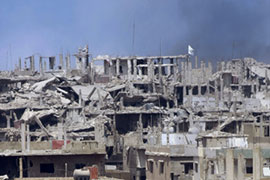Families leave Lebanon camp
Temporary truce allows wives and children of Fatah al-Islam fighters to leave.

Conditions
A clerics’ delegation trying to mediate an end to the standoff said that the military had accepted a series of conditions to allow the evacuation to go ahead.
 |
| Up to 50 Fatah al-Islam fighters are thought to remain inside Nahr al-Bared [AFP] |
The women and children have been inside the battered camp since May 20, when the fighting between the army and Fatah al-Islam erupted.
The evacuation could pave the way for the army to launch a final assault on the 35 to 50 fighters believed to still be holed up in the camp.
“Some sources are telling us it [the evacuation] could be a test. Fatah al-Islam would like to see how the Lebanese army deals with the families to see whether there could be a possibility for surrender,” Zeina Khodr said.
Gunfire and shelling could be heard again shortly after the evacuation on Friday, signalling that the temporary truce was over.
Overnight talks
After negotiations began on Monday, the army said it would allow the families safe passage from the seafront camp but the delegation of clerics lost contact with the fighters.
Most of the about 35,000 residents of the Nahr al-Bared fled shortly after the army began to bombard Fatah al-Islam positions with artillery and tank shells.
At least 200 people, including 142 soldiers, have been killed in the standoff, the deadliest internal unrest in Lebanon since the 1975-1990 civil war.